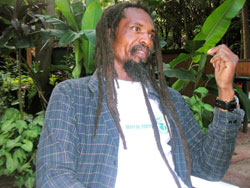KIGALI - People Living with Disabilities (PLWDs) have asked the government to revise the current law on elections, especially the clause that defines the criteria on academic qualifications of prospective candidates.According to the law, a university degree is required for representatives of special interest groups in Kigali City, Province and district level.


KIGALI - People Living with Disabilities (PLWDs) have asked the government to revise the current law on elections, especially the clause that defines the criteria on academic qualifications of prospective candidates.
According to the law, a university degree is required for representatives of special interest groups in Kigali City, Province and district level.
A secondary school diploma is required at sector level; whereas one must have completed primary six, for cell or village leadership.
The special interest groups include PLWDs, the youth and women.
A report by the National Electoral Commission on the February 2011 elections indicated that some seats reserved for PLWDs, especially at district level, remained vacant because of limited education qualifications.
One of those with disabilities, Emmanuel Gatera Rutasingwa, agrees that education is desirable, but should not be a compulsory requisite for leadership.
"Education gives added advantage to those who are naturally leaders,” he says. "Since there are few learned people with disabilities, then should we not be represented?” he questions.
Monfort Banamwana, who lives in Kigarama sector of Kicukiro District, says his lack of formal education has hindered him from competing.
He suggests that the limit be applied to other posts like those of district mayors, where candidates can meet these qualifications.
"In our time, the disabled did not go to school; education qualifications should be adjusted or left for other representatives,” he says.
Banamwana also complains of the common perception that a person with disability is limited to representing the disabled. This leaves them with a few choices, yet one may want to represent the youth or women.
The Executive Secretary of National Electoral Commission, Charles Munyaneza explained to The New Times that his office informed the Ministry of Local Government of the problem.
"We informed MINALOC about this issue after some posts remained vacant. We are looking forward to their reply.”
He added that even women were limited by the qualifications demanded at respective levels.
However, Munyaneza said that this problem did not suffice among the youth as all posts were occupied.
A legal expert at MINALOC Oswald Burasanzwe, explained that his sector plans to do a study and set standards that favour the PLWDs.
"We will make several consultations soon, and work with other bodies to set a new law if necessary,” he says. "We hope to solve the problem before the next elections.”
Ends


